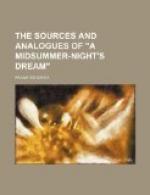Another sort there be, that will
Be talking of the Fairies still,
Nor never can they have their fill,
As they were wedded
to them;
No tales of them their thirst can slake,
So much delight therein they take,
And some strange thing they fain would
make,
Knew they the
way to do them.
Then since no Muse hath been so bold,
Or of the later, or the old,
Those elvish secrets to unfold,
Which lie from
others’ reading,
My active Muse to light shall bring
The Court of that proud Fairy King,
And tell there of the revelling:
Jove prosper my
proceeding!
And thou, Nymphidia, gentle Fay,
Which, meeting me upon the way,
These secrets didst to me bewray,
Which now I am
in telling;
My pretty, light, fantastic maid,
I here invoke thee to my aid,
That I may speak what thou hast said,
In numbers smoothly
swelling.
This palace standeth in the air,
By necromancy placed there,
That it no tempests needs to fear,
Which way soe’er
it blow it;
And somewhat southward toward the noon,
Whence lies a way up to the moon,
And thence the Fairy can as soon
Pass to the earth
below it.
The walls of spiders’ legs are made
Well mortised and finely laid;
He was the master of his trade
It curiously that
builded;
The windows of the eyes of cats,
And for the roof, instead of slats,
Is covered with the skins of bats,
With moonshine
that are gilded.
Hence Oberon him sport to make,
Their rest when weary mortals take,
And none but only fairies wake,
Descendeth for
his pleasure;
And Mab, his merry Queen, by night
Bestrides young folks that lie upright[1]
(In elder times, the mare that hight),
Which plagues
them out of measure.
Hence shadows, seeming idle shapes,
Of little frisking elves and apes
To earth do make their wanton scapes,
As hope of pastime
hastes them:
Which maids think on the hearth they see
When fires well-near consumed be,
There dancing hays[2] by two and three,
Just as their
fancy casts them.
These make our girls their sluttery rue,
By pinching them both black and blue,
And put a penny in their shoe
The house for
cleanly sweeping;
And in their courses make that round
In meadows and in marshes found,
Of them so called the Fairy Ground,
Of which they
have the keeping.
These when a child haps to be got
Which after proves an idiot
When folk perceive it thriveth not,
The fault therein
to smother,
Some silly, doating brainless calf
That understands things by the half,
Say that the Fairy left this aulfe[3]
And took away
the other.




